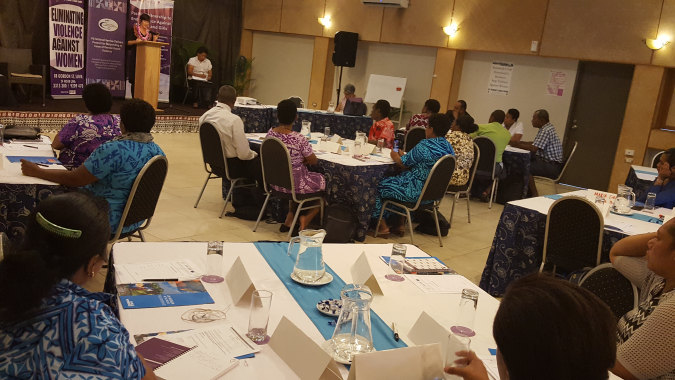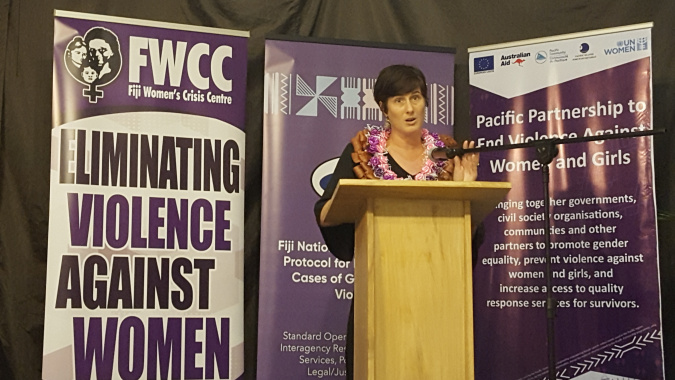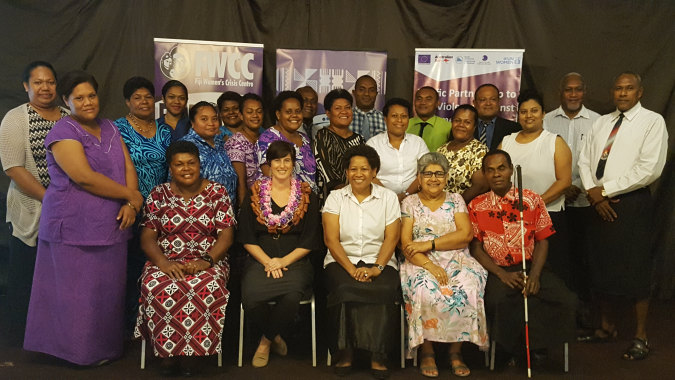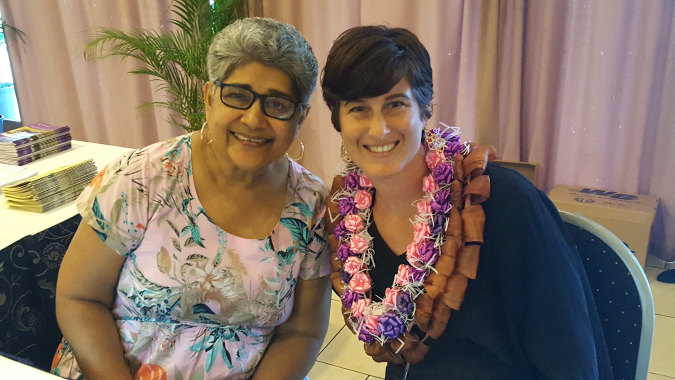A nation unites to better support survivors of gender-based violence
Date:

PRESS RELEASE
Saturday 6 April 2019 (Suva, Fiji) – Survivors of violence against women and girls are getting higher quality and more coordinated support services across Fiji.
The first in a five-month series of workshops, being held across six provinces, has marked the start of a national rollout of the Fiji Service Delivery Protocol for Responding to Cases of Gender-Based Violence (GBV).

The rollout is led by the Ministry for Women, Children and Poverty Alleviation, in partnership with the UN Women Fiji Multi-Country Office (MCO). The training is being co facilitated in cooperation with the Fiji Women’s Crisis Centre and the MWCPA. The roll out is being supported under the “Pacific Partnership to End Violence Against Women and Girls” (Pacific Partnership) which funded by the European Union, the Australian Government and the UN Women Fiji MCO.
More than 30 service providers from as far as Lau, Kadavu and Rotuma attended the initial five-day workshop for the Eastern and Southern divisions, held in Suva from 1-5 April 2019.
At Friday’s official closing of the workshop, the Permanent Secretary for Women, Children and Poverty Alleviation, Ms. Jennifer Poole, highlighted the importance of the Service Delivery Protocol (SDP) to support survivors of gender violence.
“This training in itself is a testament to multi-sectorial and interagency involvement - in a highly efficient, empowering, and a collaborative approach to tackle violence against women and children in Fiji,” Ms Poole said.

“Gender inequality and violence against women are two sides of the same coin. We cannot focus on one and neglect the other, because we will not get sustainable and life-changing results.
“The empowerment of women and girls must be central to all we do,” Ms Poole said, adding her “sincere appreciation to the team of facilitators from UN Women, Fiji Women’s Crisis Centre and the Ministry of Women, Children and Poverty Alleviation”.
The project’s aim is to ensure survivors of gender-based violence across Fiji receive a high quality support service which is coordinated, through the strengthening of referral pathways. This can be achieved by helping frontline responders – working within police, health, shelters and crisis centres, legal aid and other agencies – to work together following agreed protocols to best support survivors. The protocols ensure a survivor centered approach to allow victims and survivors of sexual and gender based violence to receive holistic services.
Participants were trained on the core guidelines and principles outlined in the Service Delivery Protocol and discussed the unique challenges faced daily by service providers in the rural and remote islands of the Eastern Division in comparison to the challenges faced in the urban centres in the Central Division.

Coordinator of the Fiji Women’s Crisis Centre (FWCC), Shamima Ali, highlighted the importance of the series of provincial workshops to help coordinate government and other services to ensure better access to support women, girls and child abuse survivors.
“The Service Delivery Protocol binds our services together by clarifying good practices and exactly what each of our services offer, and how we can best work together for the benefit of survivors,’ Ms Ali said.
“One of the most effective ways to end violence against women and girls is to ensure our laws are enforced so there is zero tolerance for domestic and sexual violence, and to provide access to quality support services for survivors to help them recover.”
The Service Delivery Protocol commits the Fiji Police Force, Judicial Department, Legal Aid Commission, civil society frontline services, Ministry of Women, Children and Poverty Alleviation, Ministry of ITaukei Affairs, Ministry of Health and Medical Services, to better coordinate their services to ensure survivors of gender-based violence receive timely and quality support. It was launched in 2018 by the Ministry of Women, Children and Poverty Alleviation and the guidelines were developed by the National Taskforce on the National Elimination of Violence against Women.

Abigail Erikson, Technical Adviser for the Ending Violence Against Women and Girls (EVAWG) programme, UN Women Fiji Multi-Country Office (MCO), highlighted the international significance of the development and rollout of Fiji’s Service Delivery Protocol’s multi-agency approach.
“At a global level, UN Women plays a lead role in supporting national governments to improve the coordination and governance of service delivery, and we’re privileged to work alongside the Fiji’s government and frontline service providers,” Ms. Erikson said. “It’s these government and civil society organizations who work tirelessly to support women, children and families to heal and recover from gender-based violence, and who collectively recognise the importance of operating from the same set of guidelines and principles that promote survivor-centred care and treatment, in line with national legislation and policies,” she said.
The rollout of the Service Delivery Protocol, led by MWCPA in partnership with UN Women, is funded through the Pacific Partnership programme funded by the European Union (EUR 12.7m) and Australian Government (EUR 6.2m) with support from UN Women (EUR 0.6m). The Pacific Partnership brings together governments, civil society organisations, communities and other partners to promote gender equality, prevent violence against women and girls (VAWG), and increase access to quality response services for survivors.
Joeli Vueti, Media Liaison Officer, Ministry of Women, Children and Poverty Alleviation, Ph:3312199 or Email:joeli.vueti@govnet.gov.fj